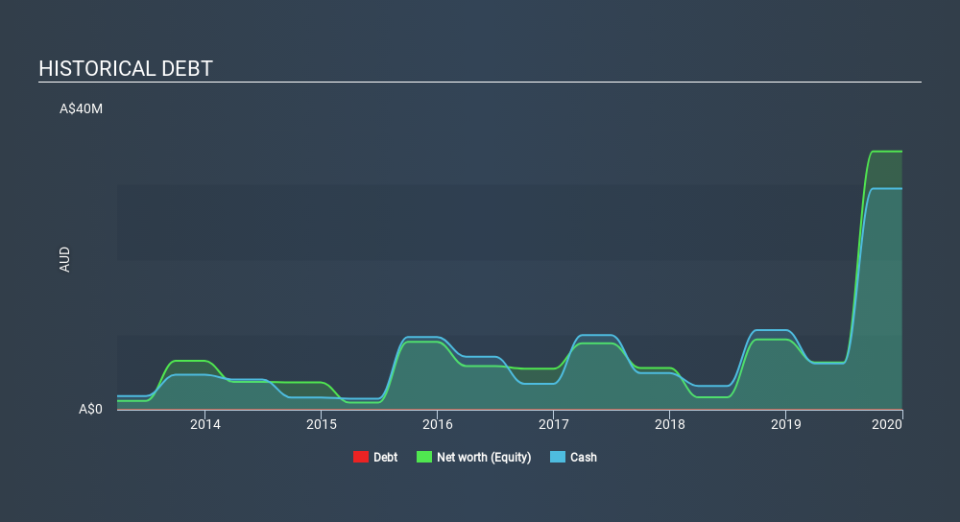The PYC Therapeutics (ASX:PYC) Share Price Has Gained 173%, So Why Not Pay It Some Attention?

The worst result, after buying shares in a company (assuming no leverage), would be if you lose all the money you put in. But on the bright side, if you buy shares in a high quality company at the right price, you can gain well over 100%. One great example is PYC Therapeutics Limited (ASX:PYC) which saw its share price drive 173% higher over five years. In the last week shares have slid back 3.2%.
See our latest analysis for PYC Therapeutics
We don't think PYC Therapeutics's revenue of AU$11,481 is enough to establish significant demand. As a result, we think it's unlikely shareholders are paying much attention to current revenue, but rather speculating on growth in the years to come. For example, they may be hoping that PYC Therapeutics comes up with a great new product, before it runs out of money.
We think companies that have neither significant revenues nor profits are pretty high risk. There is almost always a chance they will need to raise more capital, and their progress - and share price - will dictate how dilutive that is to current holders. While some such companies go on to make revenue, profits, and generate value, others get hyped up by hopeful naifs before eventually going bankrupt. Some PYC Therapeutics investors have already had a taste of the sweet taste stocks like this can leave in the mouth, as they gain popularity and attract speculative capital.
When it last reported its balance sheet in December 2019, PYC Therapeutics could boast a strong position, with cash in excess of all liabilities of AU$28m. That allows management to focus on growing the business, and not worry too much about raising capital. And with the share price up 79% per year, over 5 years , the market is focussed on that blue sky potential. You can click on the image below to see (in greater detail) how PYC Therapeutics's cash levels have changed over time. You can click on the image below to see (in greater detail) how PYC Therapeutics's cash levels have changed over time.
Of course, the truth is that it is hard to value companies without much revenue or profit. One thing you can do is check if company insiders are buying shares. It's usually a positive if they have, as it may indicate they see value in the stock. Luckily we are in a position to provide you with this free chart of insider buying (and selling).
What about the Total Shareholder Return (TSR)?
Investors should note that there's a difference between PYC Therapeutics's total shareholder return (TSR) and its share price change, which we've covered above. The TSR attempts to capture the value of dividends (as if they were reinvested) as well as any spin-offs or discounted capital raisings offered to shareholders. PYC Therapeutics hasn't been paying dividends, but its TSR of 228% exceeds its share price return of 173%, implying it has either spun-off a business, or raised capital at a discount; thereby providing additional value to shareholders.
A Different Perspective
It's nice to see that PYC Therapeutics shareholders have received a total shareholder return of 141% over the last year. Since the one-year TSR is better than the five-year TSR (the latter coming in at 27% per year), it would seem that the stock's performance has improved in recent times. In the best case scenario, this may hint at some real business momentum, implying that now could be a great time to delve deeper. While it is well worth considering the different impacts that market conditions can have on the share price, there are other factors that are even more important. Consider for instance, the ever-present spectre of investment risk. We've identified 4 warning signs with PYC Therapeutics (at least 2 which can't be ignored) , and understanding them should be part of your investment process.
If you would prefer to check out another company -- one with potentially superior financials -- then do not miss this free list of companies that have proven they can grow earnings.
Please note, the market returns quoted in this article reflect the market weighted average returns of stocks that currently trade on AU exchanges.
If you spot an error that warrants correction, please contact the editor at editorial-team@simplywallst.com. This article by Simply Wall St is general in nature. It does not constitute a recommendation to buy or sell any stock, and does not take account of your objectives, or your financial situation. Simply Wall St has no position in the stocks mentioned.
We aim to bring you long-term focused research analysis driven by fundamental data. Note that our analysis may not factor in the latest price-sensitive company announcements or qualitative material. Thank you for reading.

 Yahoo Finance
Yahoo Finance 
